 MyDogBreeds
MyDogBreeds Serbian Hound is originated from Serbia but Cirneco dell'Etna is originated from Italy. Both Serbian Hound and Cirneco dell'Etna are having almost same height. Serbian Hound may weigh 11 kg / 25 pounds more than Cirneco dell'Etna. Both Serbian Hound and Cirneco dell'Etna has same life span. Serbian Hound may have less litter size than Cirneco dell'Etna. Serbian Hound requires Low maintenance. But Cirneco dell'Etna requires Moderate maintenance
Serbian Hound is originated from Serbia but Cirneco dell'Etna is originated from Italy. Both Serbian Hound and Cirneco dell'Etna are having almost same height. Serbian Hound may weigh 11 kg / 25 pounds more than Cirneco dell'Etna. Both Serbian Hound and Cirneco dell'Etna has same life span. Serbian Hound may have less litter size than Cirneco dell'Etna. Serbian Hound requires Low maintenance. But Cirneco dell'Etna requires Moderate maintenance
 Once known as the Balkan Hound, the Serbian Hound is a scenthound, an ancient dog breed that dates back to the 11th century. He has always been a hunting dog, hunting in packs, but today he is essentially a pet and a companion.
Once known as the Balkan Hound, the Serbian Hound is a scenthound, an ancient dog breed that dates back to the 11th century. He has always been a hunting dog, hunting in packs, but today he is essentially a pet and a companion.
Although the breed is very popular in Serbia, they have not spread much outside of the Balkan region. The first description of the Serbian Hound dates from 1905. The first standard for the dog was published in 1924.
This dog isn’t recognized by the AKC but he has been recognized by the FCI in 1940 and in 2006 by the United Kennel Club.
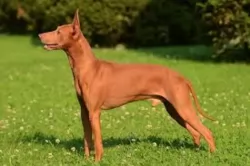 The Cirneco dell’Etna comes from the island of Sicily and not mainland Italy, although it is considered an Italian dog. It is a small dog that hunted rabbits and its calling card was its ability to go for hours without water or food. They have terrific endurance and a good sense of smell. They were developed for the harsh terrain they worked around places like Mount Etna. Of all the Mediterranean island hunting dogs, the Cirneco de’Etna is the smallest.
The Cirneco dell’Etna comes from the island of Sicily and not mainland Italy, although it is considered an Italian dog. It is a small dog that hunted rabbits and its calling card was its ability to go for hours without water or food. They have terrific endurance and a good sense of smell. They were developed for the harsh terrain they worked around places like Mount Etna. Of all the Mediterranean island hunting dogs, the Cirneco de’Etna is the smallest.
This is a very ancient breed, surviving on its hunting skills alone for thousands of years on Sicily. They then became guard dogs for the peasants. Because they had such speed, sense of smell, alertness and sight, they were great hunters.
Today’s Cirneco de’Etna is highly competitive in confirmation and make terrific pets. They are exceedingly friendly, energetic and low maintenance. Lure coursing is what they really excel at. They are good at agility and pursuit games as well.
 The Serbian Hound isn’t a particularly large dog. He is medium sized, standing at between 44 to 56cm in height and weighing in the region of 11 to 23kg. The coat of the dog is a red or tan color with a black saddle.
The Serbian Hound isn’t a particularly large dog. He is medium sized, standing at between 44 to 56cm in height and weighing in the region of 11 to 23kg. The coat of the dog is a red or tan color with a black saddle.
The hair is short, thick and shiny with the hair being slightly longer over the thigh area. The ears are high set, are of medium length and are floppy. The average litter size for these dogs is 3 to 6 puppies.
The good-natured Serbian Hound makes a loving and devoted pet. He’ll get on well with children too. They’re friendly dogs with a relaxed disposition, but to maintain that easy going characteristic, they will need to be well exercised.
They’re intelligent dogs with an independent side to them, and some training and socialization will be recommended.
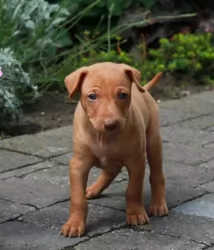 The Cirneco de’Etna is a sleek, muscular sighthound. His ears are close together and high on his head. The head is lean, and the skull is almost flat in profile. The muzzle is about the same length as the skull and the nose is large and its coloring matches the dog’s coat. They have hard pads the same color as their nails, but they are never black.
The Cirneco de’Etna is a sleek, muscular sighthound. His ears are close together and high on his head. The head is lean, and the skull is almost flat in profile. The muzzle is about the same length as the skull and the nose is large and its coloring matches the dog’s coat. They have hard pads the same color as their nails, but they are never black.
 The Serbian Hound is a working dog that just loves being busy, and he can keep busy for a long time as he has plenty of stamina.
The Serbian Hound is a working dog that just loves being busy, and he can keep busy for a long time as he has plenty of stamina.
He is an easy going dog, laid back, social and lively as well as being loving and loyal. They’re independent and strong-willed as well as being intelligent. You shouldn't have any difficulty training and socializing him, and it will round your pet off nicely, making him an even better companion and pets.
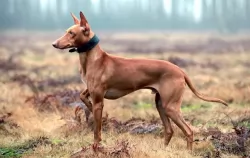 The Cirneco de’Enta is an independent and intelligent breed. They are good-natured and love to be with their people. They are more trainable than the usual sighthound. They are loyal and fun loving but they need a job.
The Cirneco de’Enta is an independent and intelligent breed. They are good-natured and love to be with their people. They are more trainable than the usual sighthound. They are loyal and fun loving but they need a job.
 Your Serbia Hound can live to be 12 to 15 years of age, but just like with other dogs, he will need to be watched for some of the common dog diseases there are. Cancer, bloat, skin infections and kennel cough are all diseases to look out for.
Your Serbia Hound can live to be 12 to 15 years of age, but just like with other dogs, he will need to be watched for some of the common dog diseases there are. Cancer, bloat, skin infections and kennel cough are all diseases to look out for.
Ear infections are common in dogs with floppy ears. You need to check inside your dog’s ears as an ear infection can be a painful condition. You’ll see your dog scratching at his ears and shaking his head.
Most ear infections are caused by bacteria and yeast or even ear mites. You can’t play around with an ear infection and the veterinarian will take a sample from the affected ear. Most people don’t like to fiddle around with the inner ear and prefer to leave this grooming part to the vet or a professional groomer.
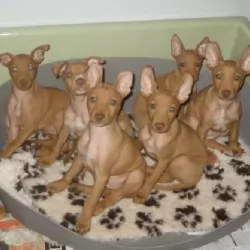 Like many dogs that come from ancient breeds with little cross breeding over the years, there are not a lot of inherited issues for the Cirneco de’Etna. Also, there are so few dogs remaining that little is known about their health in general and there are no studies to go on. Some breeders will do test despite the fact that none are recommended.
Like many dogs that come from ancient breeds with little cross breeding over the years, there are not a lot of inherited issues for the Cirneco de’Etna. Also, there are so few dogs remaining that little is known about their health in general and there are no studies to go on. Some breeders will do test despite the fact that none are recommended.
Their most common health issues are acquired such as injuries from running or competitions and obesity. Both can be controlled by the owner.
 Serbian Hounds with their short coats are low maintenance. Yes, they do shed throughout the year, and have some seasonal shedding. A good brush twice a week will be adequate for this dog.
Serbian Hounds with their short coats are low maintenance. Yes, they do shed throughout the year, and have some seasonal shedding. A good brush twice a week will be adequate for this dog.
Check your Serbian Hound’s ears and eyes for infection. Also, as you brush him, take note of any new or unusual lumps you come across.
As a medium-sized dog, if you choose to feed your dog kibble, it will need to be according to size, his age and activity levels. Read the labels carefully to make sure you know how to feed your Serbian Hound the best way.
Choose kibble that has a good selection of vitamins and minerals in it. Try and provide your pet with some home made food too and add it twice a week to the dry kibble to give him some variety and a tasty treat.
Boiled chicken, brown rice, sweet potatoes, carrots and spinach are simple foods – good for a dogs digestion. By also adding a bit of raw meat to his food you help him maintain a healthy coat and skin.
As a hunting breed, this dog has a lot of stamina and energy. He is going to require a good deal of exercise every day. Walks are always a good thing but he’ll want more energetic action – runs, ball games and some swimming.
Toys and equipment that can provide him with mental stimulation will be good for him too as he is a mentally sharp dog.
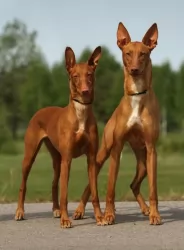 The Cirneco needs a good quality food since they are such high energy dogs. Be careful not to overfeed them so that they become obese.
The Cirneco needs a good quality food since they are such high energy dogs. Be careful not to overfeed them so that they become obese.
As previously mentioned, the main concern for owners is injuries acquired while on a running course or in the activities of daily living. They have been known to hurt their feet. They need their ears checked regularly for any signs of infection or irritation. Clean out any excess water or dirt.
This is an intelligent, hardy breed that needs mental and physical stimulation. They need a job, or they can be a major problem. They love hunting of course but also excel at agility, lure crossing, and competition. He is loyal and loves being with people. Take him for long walks but don’t let him off the leash.